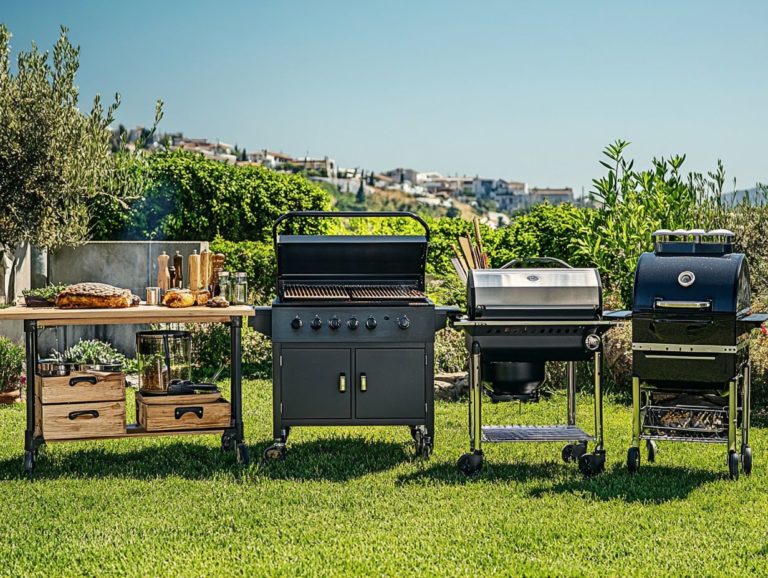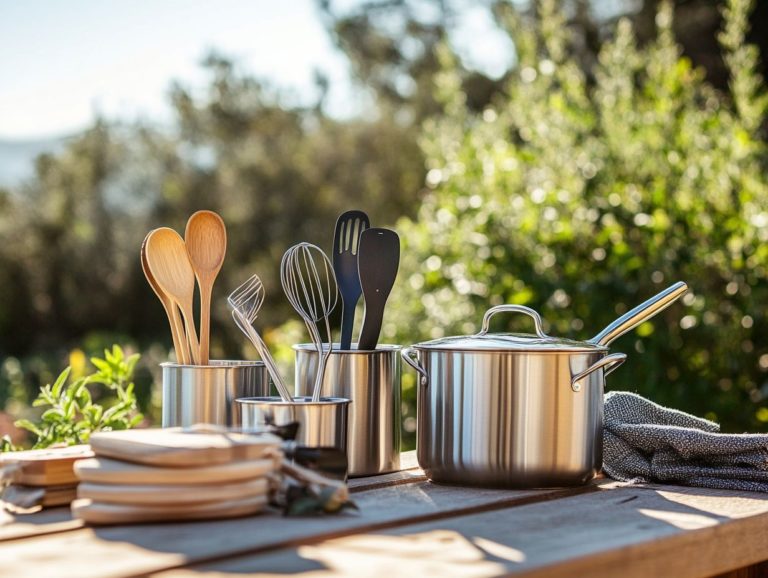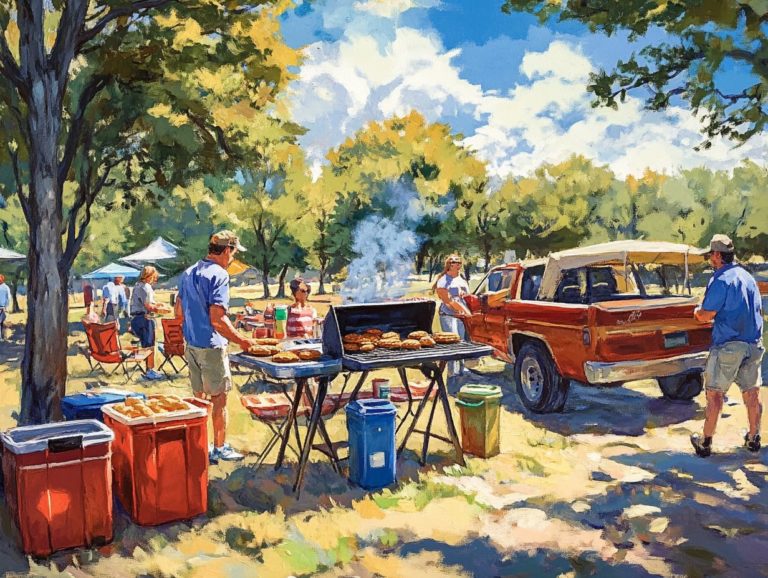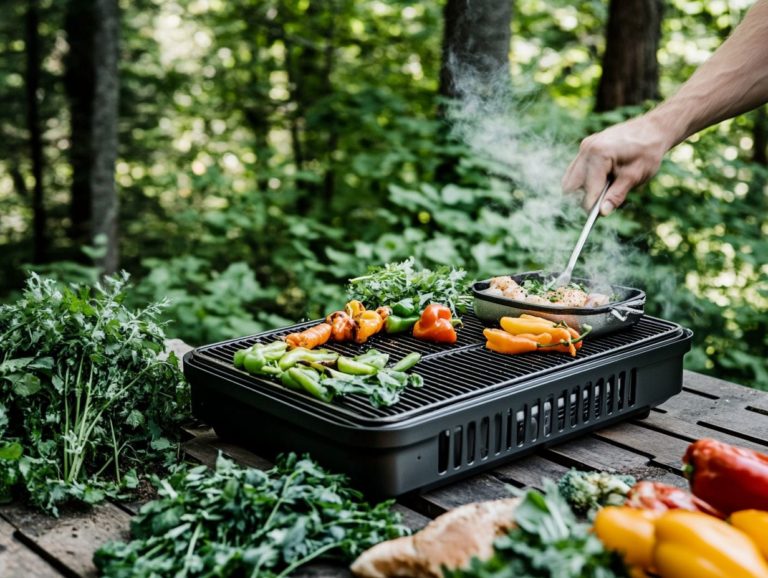What to Pack for Outdoor Cooking Trips
Embarking on an outdoor cooking trip opens up a world of delicious possibilities. It demands meticulous preparation, especially when setting up your camping kitchen.
From selecting the right cooking gear, including a portable grill and a cooler, to mastering diverse techniques like grilling and campfire cooking, every detail significantly impacts your culinary journey.
This guide equips you with everything you need to know about meal planning, preparation, and clean-up, all while prioritizing food safety.
Get ready to take your outdoor cooking to the next level, complete with spices and a handy picnic bag, and transform every meal into a memorable experience!
Contents
- Key Takeaways:
- Essentials for Outdoor Cooking Trips
- Cooking Methods for Outdoor Trips
- Meal Planning and Preparation
- Clean-Up and Food Storage
- Frequently Asked Questions
- What should I pack for outdoor cooking trips?
- What basic cooking supplies should I bring?
- What s the best food to pack for my outdoor cooking trip?
- How much water should I bring for outdoor cooking trips?
- What safety precautions should I take when packing for outdoor cooking trips?
- Is it necessary to bring a camping stove for outdoor cooking trips?
Key Takeaways:
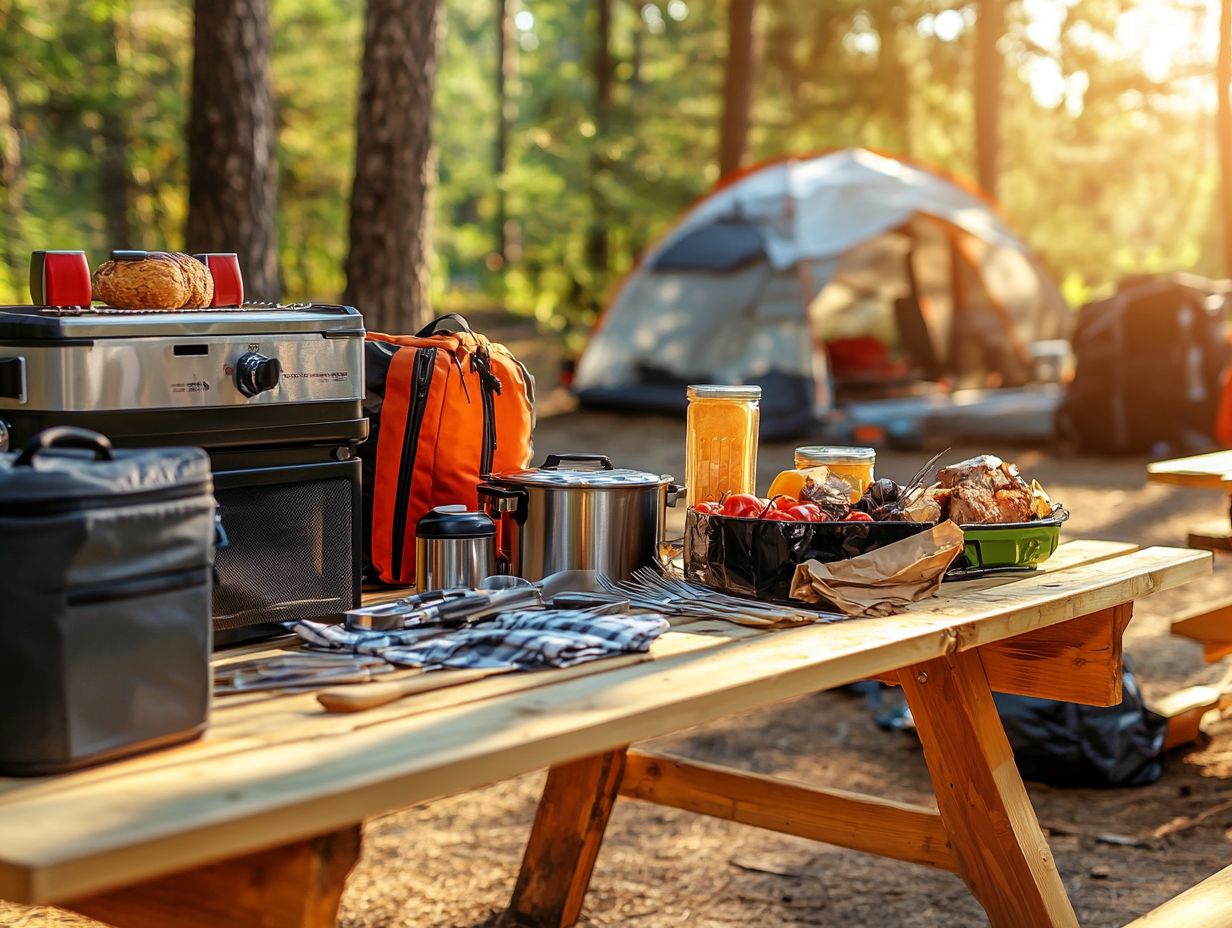
- Pack essential cooking gear like a portable stove, pots, pans, and utensils for outdoor cooking trips.
- Bring key ingredients and spices for easy and delicious meals.
- Plan and pack meals ahead of time using your camping checklist and employ efficient cooking methods like grilling and campfire cooking.
Essentials for Outdoor Cooking Trips
When you embark on outdoor cooking trips, building a good camping kitchen is essential. Equip yourself with the right cooking gear, such as a water canister and a camping grill, to ensure a successful and enjoyable experience.
Thoughtfully select your camping grill and portable grill while packing essential cooking utensils. A comprehensive camping checklist can truly transform your adventure. Prioritize meal prep and organization; items like a coffee maker, a selection of spices, a water jug, and a durable cast iron skillet can elevate your outdoor culinary endeavors.
These small touches will make your trip not just memorable but also deeply satisfying.
Must-Have Cooking Gear
Equipping your camping kitchen with essential cooking gear is crucial for a remarkable outdoor culinary adventure. This allows you to whip up delightful meals amidst nature s beauty.
Consider a portable grill as the perfect centerpiece for crafting mouthwatering dishes, while cast iron skillets provide the versatility needed for frying, saut ing, or even baking over an open flame. Reliable cooking utensils, including a good dishwashing liquid, are equally important; a sturdy set of spatulas, tongs, and forks can drastically simplify meal preparation.
Never overlook food safety during your outdoor trips. A cooler keeps your camping food fresh and regulates temperatures for perishables, ensuring safer dining under the stars. When packing, opt for lightweight storage containers and organize your utensils and cookware in one dedicated bag, making your journey to the campsite as smooth as possible.
Essential Ingredients and Spices
Having a well-stocked selection of essential ingredients and spices is vital for elevating your camping food experience. This allows you to craft flavorful meals while soaking in the beauty of nature.
Among the best choices are versatile spices like garlic powder, paprika, and cumin; they enhance a variety of dishes without taking up precious space in your pack. Don t overlook dried herbs like oregano and thyme they offer effortless flavor boosts to grilled meats and vegetables.
Meal prep is key to maximizing enjoyment on your camping trips. Keeping everything organized ensures you can focus on savoring the moment rather than scrambling for ingredients. A good recipe book can be your trusted companion, providing inspiration and guiding you to plan satisfying meals that truly delight, including ideas for meals with vegetables, fruits, and even sauerkraut.
With the right recipes, you’ll find cooking easier and more enjoyable, encouraging your creativity and turning simple outdoor dining into memorable culinary adventures.
Cooking Methods for Outdoor Trips
In terms of outdoor cooking, mastering a range of techniques like grilling using your portable grill and campfire cooking can significantly elevate your culinary experience. This expertise allows you to savor delectable meals beneath a starry sky, transforming every gathering into a memorable feast.
So pack your gear and start planning your outdoor cooking adventure today!
Grilling
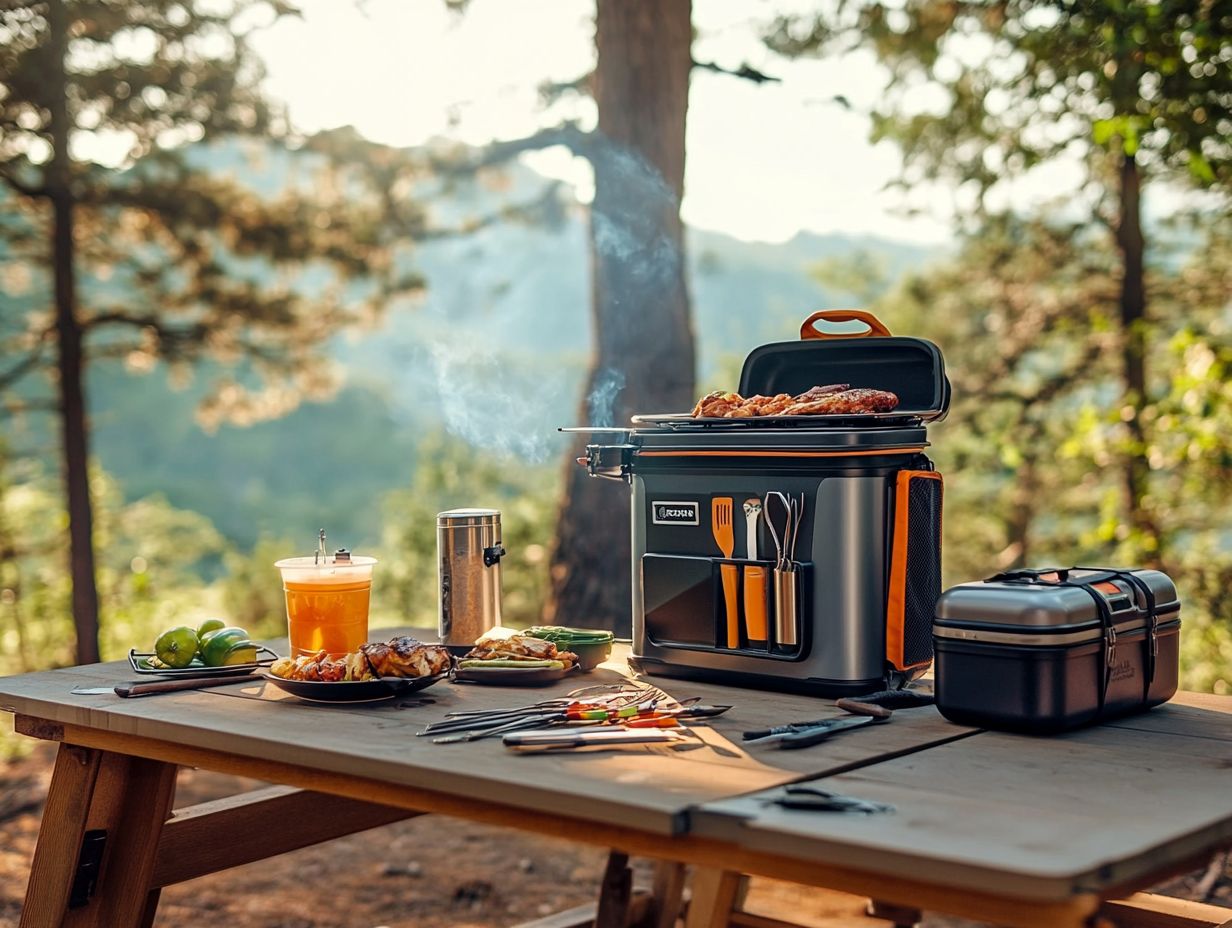
Grilling is an exquisite cooking method for your outdoor excursions. It allows you to prepare a delectable array of meats and vegetables while infusing them with rich flavors. This approach not only enhances the taste but also adds a delightful social aspect. Friends and family gather around the grill, bonding over the sizzling sounds and mouth-watering aromas. You can share snacks and stories as you cook.
To truly maximize your camping grill experience, begin by marinating your meats in advance. This step tenderizes them while infusing delightful spices that elevate the overall flavor. For vegetables, a simple sprinkle of seasoning can significantly enhance their natural tastes.
Using a cooler keeps your food fresh and ensures quality is preserved until it s time to cook. By organizing your ingredients and prepping them while enjoying the great outdoors, you enrich both the process and the outcome of your cooking experience.
Campfire Cooking
Campfire cooking adds distinct charm to your outdoor adventures. It enables you to prepare delicious meals over an open flame while soaking in the beauty of nature. This timeless tradition engages your senses and fosters a sense of camaraderie among friends and family.
To embark on this culinary journey, consider using a cast iron skillet or your camping grill. A cast iron skillet retains heat well, making it perfect for searing meats, cooking eggs, or frying vegetables to perfection. Managing the fire effectively is crucial for achieving ideal cooking temperatures. Arrange the coals evenly and maintain good flame control to dramatically influence the success of your dish.
Explore popular camping recipes like foil packet meals, hearty stews, or dishes featuring kimchi. These invite creativity and simplicity. Remember, keeping things clean is key to a fun camping trip! Have adequate cleaning supplies handy to ensure your campsite remains safe and inviting for everyone.
Meal Planning and Preparation
Effective meal planning and preparation are essential for a successful camping trip. By ensuring you have all the necessary ingredients, including fresh fruits and spices, and tools at your disposal, you can craft delightful meals amidst the beauty of nature.
Tips for Planning and Packing Meals
- Think about food storage options like a camping box.
- Consider portability and meal variety to ensure a satisfying experience.
- Using a cooler enhances the freshness of perishable items, allowing for a diverse menu featuring fresh fruits, vegetables, and meats, along with easy-to-prepare snacks.
- Pack your cooking gear strategically, prioritizing multi-functional items like a pot that can also serve as a frying pan.
- Include a selection of non-perishable camping food items such as canned goods, pasta, and grains. These cut down on cooking time and preparation stress.
- Outdoor adventurers like you can savor balanced meals that are nutritious and easy to prepare, enhancing the overall enjoyment of your camping experience.
Prepping and Cooking on the Go
Prepping and cooking while on the move can be a truly rewarding experience. It allows you to whip up satisfying meals amid the beauty of nature.
To fully embrace this adventure, equip yourself with simple yet effective cooking gear. Think compact stoves, lightweight pots, and sturdy utensils designed to endure the challenges of outdoor cooking.
It s not just about the cooking; selecting camping food options that are easy to pack and prepare is equally important. Items like dehydrated meals, canned goods, and pre-chopped vegetables can streamline the process and keep things hassle-free.
And let s not forget about cleanliness and hygiene. Having the right cleaning supplies like dishwashing liquid on hand is crucial. This ensures that all surfaces and gear remain sanitized, transforming your outdoor cooking experience into something enjoyable and safe.
Clean-Up and Food Storage
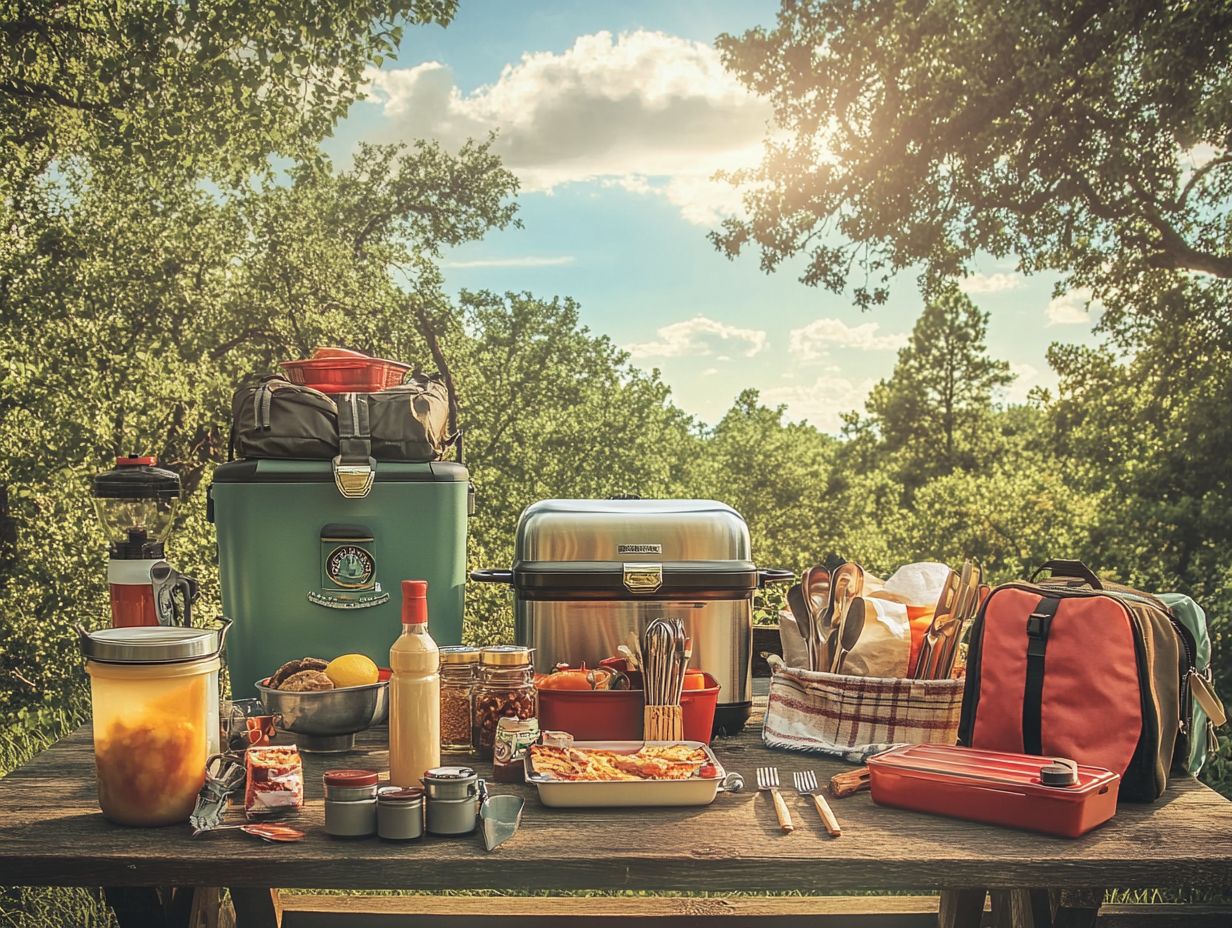
Proper clean-up and food storage are crucial for outdoor cooking. Keeping a tidy campsite and securely storing food in your cooler or camping box helps preserve your meals and minimizes the risk of spoilage and wildlife encounters.
Proper Hygiene and Waste Disposal
Good hygiene and waste disposal practices are essential for preserving the environment and ensuring a safe cooking experience outdoors.
Hygiene safeguards you from illnesses and reduces your environmental impact. Prioritize effective cleaning supplies, such as biodegradable soap, dishwashing liquid, and hand sanitizer.
Implement smart waste disposal techniques by using designated trash bags and separating recyclables, especially for items like aluminum cans. Incorporating these hygiene practices into your camping checklist ensures you are organized, prepared, and ready for a clean and enjoyable outdoor culinary experience.
Storing Food Safely in the Outdoors
Storing food safely outdoors requires careful planning and the right gear to prevent spoilage and keep wildlife at bay.
Selecting ideal storage solutions, like coolers and camping boxes, is crucial for any outdoor excursion. These containers maintain the perfect temperature for perishables and act as barriers against curious animals.
Pack perishables in airtight bags or containers, layering them with ice packs to extend freshness. Using separate compartments for different food types reduces the risk of mixing food together.
By organizing your supplies and frequently checking your food items, you can enjoy delightful meals even in the heart of the wilderness.
Frequently Asked Questions
What should I pack for outdoor cooking trips?
When preparing for an outdoor cooking trip, pack the right supplies and equipment. Here are essential items to include in your packing list:
What basic cooking supplies should I bring?
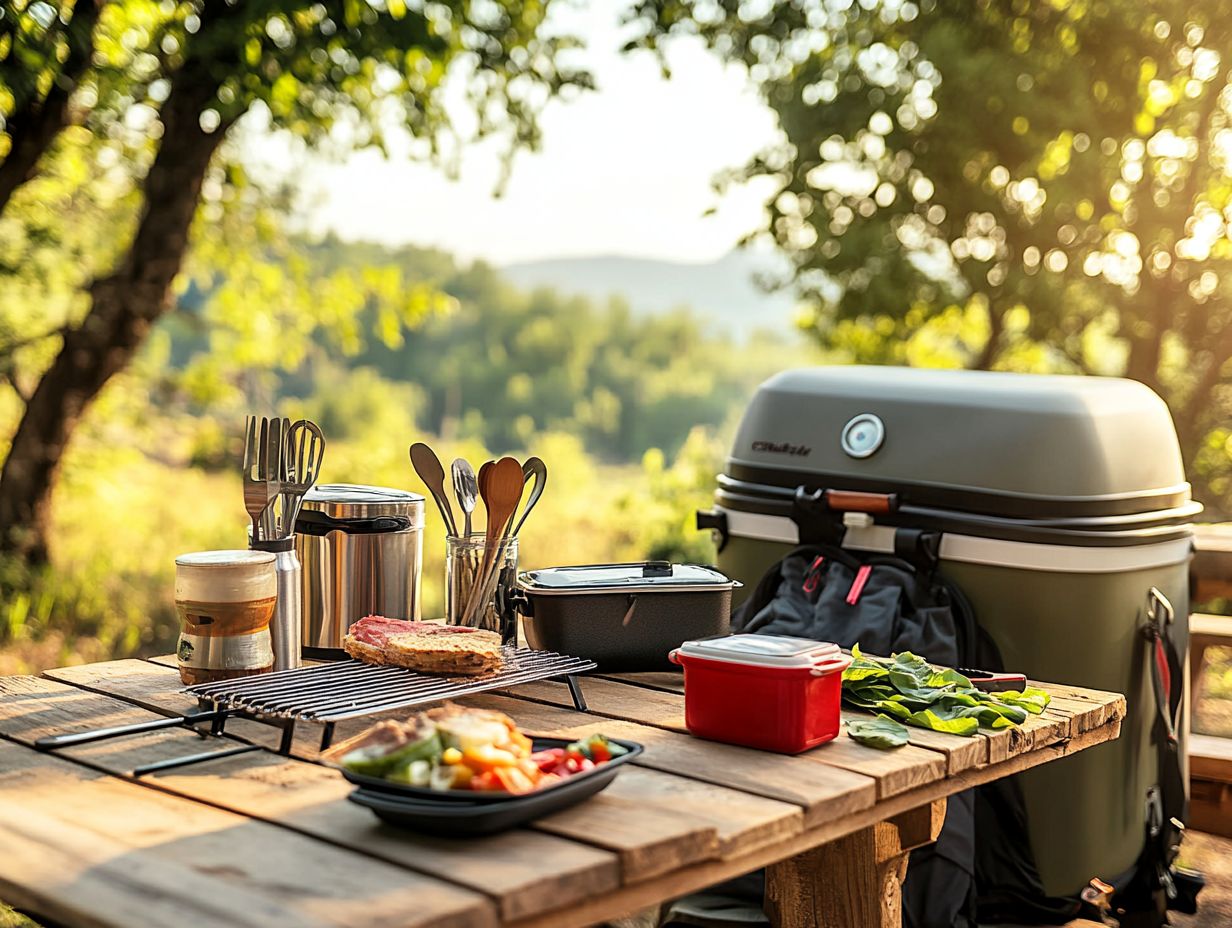
Basic cooking supplies for outdoor trips include a portable stove or grill, a pot and pan set, utensils, plates and bowls, a cutting board, and a can opener. Don t forget cleaning supplies like dish soap and sponges.
What s the best food to pack for my outdoor cooking trip?
When deciding what food to pack, consider easy-to-prepare meals such as canned foods, dehydrated meals, and non-perishable items like granola bars and trail mix. Fresh fruits and vegetables are also great but make sure to keep them in a cooler.
How much water should I bring for outdoor cooking trips?
Staying hydrated is important, especially if you re hiking or engaging in physical activities. Plan to bring at least 2 liters of water per person per day, and more if you re in a hot or dry climate.
What safety precautions should I take when packing for outdoor cooking trips?
Store and dispose of your food properly to avoid attracting wild animals. Bring a first aid kit and any necessary medication. Check the weather forecast and pack appropriate clothing and gear to stay safe and comfortable.
Is it necessary to bring a camping stove for outdoor cooking trips?
While you can cook over a campfire, it s highly recommended to bring a camping stove. This provides a controlled cooking method and allows you to cook even if fire restrictions are in place.

